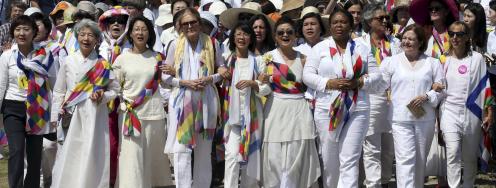Bill Clinton in North Korea
Has former President Bill Clinton's successful mission to Pyongyang to win the release of two American journalists opened up a new chapter in U.S.-North Korea relations?
There are two main things to keep focused on in the aftermath of this event. First, what door does this open with respect to re-engaging with the DPRK? Notice I did not say "when will they return to the Six Party Talks" or "when will the U.S. and North Korea meet." Rather, this is an important opportunity to probe initial options to re-engage on any number of fronts. It may be big-picture and high-level, or it may be low-key and tentative. Given the chilled atmosphere that has gripped diplomacy over the past six months, we have to be ready for entry points that may seem completely unrelated to plutonium, bombs, missile tests and proliferation. While symphony orchestra visits or scientific exchanges may come out of left field, they may be exactly the non-controversial types of ventures that can help get us back into the business of tackling the nuclear issue. So we should be watching and listening for what President Clinton may have to report upon his return about things the North mentioned, and treat them seriously. This is an opportunity to demonstrate that there are pragmatic ways that we can work toward what we want without "caving in" or "rewarding bad behavior."
Second, we need to have at the ready a holistic plan that informs and guides policy toward North Korea that is robust enough to weather the inevitable ups and downs of the diplomatic road. In other words, we need to break out of the posture of reacting to events in a fire-drill fashion and craft a thoughtful, tough, yet pragmatic North Korea policy that takes into account the myriad complexities of the challenge, including relationships with allies, the legitimate security concerns of all parties, domestic political obstacles and, ultimately, the end game rather than short-term fixes.
Fortunately, Ploughshares-funded organizations and individuals are designing just such a plan. Their final report is about to be released. The National Committee on North Korea and the Social Sciences Research Council have participated in the effort. They and others we support have solid ties with the administration and Congress. With Bill Clinton's current visit and the potential for opening a new chapter of effective diplomacy with the DPRK, now is the time for policymakers to take heed.




